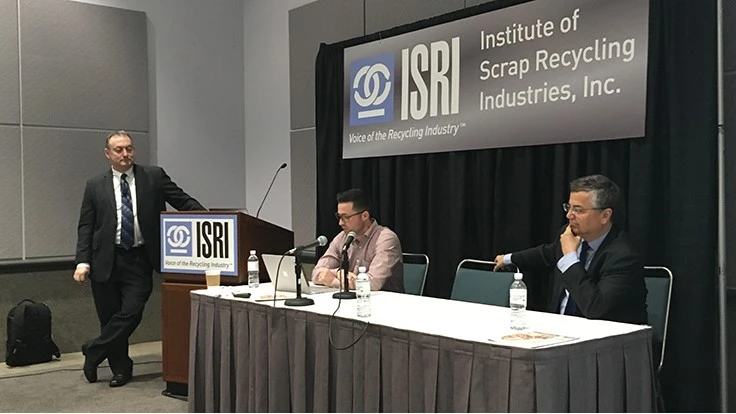
The owners of privately held scrap recycling companies have several options from which to choose when they are read to exit the business, but they will be well served to think ahead about them. That was the viewpoint offered by two lending advisors who gave presentations at the ISRI2019 convention, which took place in Los Angeles in April.
Even if such company owners have a next generation with an interest in running the firm, there are still financial and timing considerations that make the situation far from simple, said Vince Pappalardo, who works in the Chicago office of investment banking firm Brown Gibbons Lang & Co.
Pappalardo said transitioning ownership in a family business can become more complicated with each succeeding generation, especially when the number of shareholders or stakeholders increases “and the objectives can be different for each.”
He said some younger generations may not have an interest in their parents’ company, although in 2009 and after, when other career options were limited, many “new college graduates joined the family business and found they liked it.”
Pappalardo said that even when there is an “obvious” heir or heirs to take over, “sometimes that heir is not ready,” meaning company owners and their outside advisors may need to conduct a search process for executive talent.
For company owners who know they want to sell, a complication can arise between maintaining confidentiality and also wishing to “shop” the company to a broad range of potential buyers. Pappalardo said a technique he prefers is to contact a dozen or so select privately held companies that maintain confidentiality to conduct a “controlled auction [by] talking to a small number of people at a high level.” He said his knowledge and contacts in such situations “is part of the reason people come to me” when they are interested in selling.
Andrew Pappas of Chicago-based BMO Harris Bank said many factors figure into determining the valuation of a scrap company, including its ownership structure, the quality and depth of its management team, cash flow, product lines, and strength of customer and vendor relationships.
A banker or buyer will want to review audited financials, recent internal financial statements, financial projections, accounts receivables, inventory and fixed assets, said Pappas. Potential buyers also will consider overall industry trends and performance, he added.
Sean Daoud of PNW Metal Recycling, Longview, Washington, gave the point of view of a younger generation family scrap company executive, and urged older generation members to be supportive of those still learning the industry.
The key to cross-generational success, said Daoud is to “communicate—ask questions of each other.” The succession or transition time, he said is ideal for “openly sharing knowledge” and considering ideas “consistently and openly.”
ISRI2019, the annual convention of the Washington-based Institute of Scrap Recycling Industries (ISRI), was April 8-11 at the Los Angeles Convention Center in Los Angeles.
Latest from Recycling Today
- Reconomy brands receive platinum ratings from EcoVadis
- Sortera Technologies ‘owning and operating’ aluminum sorting solutions
- IDTechEx sees electric-powered construction equipment growth
- Global steel output recedes in November
- Fitch Ratings sees reasons for steel optimism in 2025
- P+PB adds new board members
- BlueScope, BHP & Rio Tinto select site for electric smelting furnace pilot plant
- Magnomer joins Canada Plastics Pact





